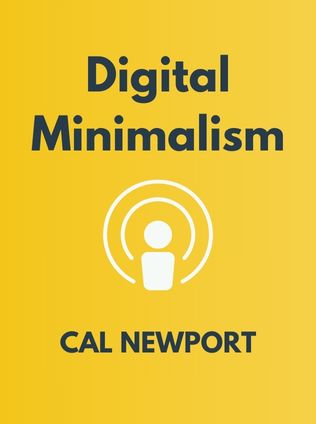
Digital Minimalism
Choosing a Focused Life in a Noisy World
By Cal Newport
Published 01/2019
About the Author
Cal Newport is a computer science professor at Georgetown University and a well-known author and speaker on topics related to digital technology, productivity, and deep work. He has written several best-selling books, including "Deep Work" and "So Good They Can't Ignore You," which have inspired countless individuals to rethink their relationship with work and technology. Newport's writing focuses on how to harness technology effectively while avoiding its many distractions. His work is particularly relevant in today's hyper-connected world, where digital distractions are pervasive. In "Digital Minimalism," Newport delves into the philosophy and practice of reducing digital noise to reclaim focus and improve the quality of life.
Main Idea
"Digital Minimalism" by Cal Newport is a call to reclaim control over our technology-driven lives. The book introduces a philosophy of technology use that aims to maximize the benefits of digital tools while minimizing their negative impact on our time, attention, and overall well-being. Newport argues that by adopting digital minimalism, individuals can break free from the addictive grips of technology, regain autonomy over their attention, and focus on what truly matters in life. The book is both a critique of the current digital landscape and a practical guide for those looking to cultivate a more intentional relationship with technology.
Table of Contents
- 1. The Case for Digital Minimalism
- 2. The Principles of Digital Minimalism
- 3. Starting with a Digital Declutter
- 4. Reclaiming Your Time and Attention
- 5. Embracing Solitude
- 6. Reclaiming Leisure
- 7. Reclaiming Your Relationships
- 8. A New Philosophy of Technology Use
The Case for Digital Minimalism
Newport begins by addressing the overwhelming presence of technology in our daily lives. He argues that the modern digital landscape, filled with smartphones, social media, and other addictive technologies, has led to a loss of control over how we spend our time and attention. He writes,
"The more you use your digital devices, the more they use you."The author contends that while these technologies were adopted for their benefits, they have come to dominate our lives in ways that are often detrimental to our well-being.
Newport presents a compelling case for why digital minimalism is necessary. He points out that many digital tools, particularly social media platforms, are designed to be addictive, keeping users engaged for as long as possible to increase profits in what he calls the "attention economy." This design not only consumes valuable time but also distracts individuals from engaging in more meaningful activities.
To illustrate the impact of digital overuse, Newport shares examples of how constant connectivity and digital distractions have led to increased stress, anxiety, and a general sense of dissatisfaction. He argues that digital minimalism offers a solution by encouraging individuals to be more intentional about their technology use, allowing them to focus on what truly matters and reduce the negative effects of digital overload.
The Principles of Digital Minimalism
The foundation of Newport's argument is the philosophy of digital minimalism, which he defines as a way to maximize the benefits of technology while minimizing its downsides. He outlines three core principles that guide this philosophy:
- Eliminate Clutter: Newport advises that individuals should critically assess the digital tools they use and eliminate those that do not add significant value to their lives. He suggests conducting a cost-benefit analysis for each tool, asking whether it is the best way to support one's values and priorities. "You might find that the convenience of some tools is outweighed by the distractions they bring."
- Optimize Technology Use: After reducing digital clutter, Newport recommends optimizing the use of the remaining tools. This means using digital tools in a way that maximizes their benefits while minimizing distractions. For example, rather than mindlessly scrolling through social media, one might use it strategically for specific purposes, such as networking or staying informed about important topics.
- Regain Control and Empowerment: Newport emphasizes the importance of taking control of one's technology use rather than being controlled by it. He argues that by reclaiming autonomy over how and when we use digital tools, individuals can feel more empowered and less overwhelmed by technology.
These principles are not just theoretical; Newport provides practical examples of how they can be applied in everyday life. For instance, he suggests limiting social media use to specific times of the day or using apps that block distractions during work hours. The goal is to create a more intentional and focused approach to technology use that aligns with one's values and priorities.
Sign up for FREE and get access to 1,400+ books summaries.
You May Also Like
The Subtle Art of Not Giving a F*ck
A Counterintuitive Approach to Living a Good Life
By Mark MansonRich Dad Poor Dad
What the Rich Teach Their Kids About Money - That the Poor and Middle Class Do Not!
By Robert T. KiyosakiHow To Win Friends and Influence People
The All-Time Classic Manual Of People Skills
By Dale CarnegieQuiet: The Power of Introverts
The Power of Introverts in a World That Can't Stop Talking
By Susan Cain



















